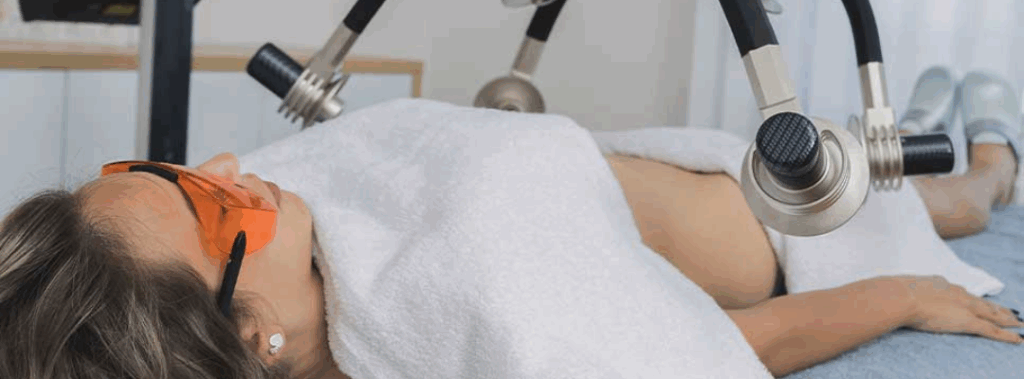
Chiropractic care is a branch of medicine that focuses on detecting and correcting misalignments in the body that cause pain or discomfort. A chiropractor is a professional trained to diagnose and manually manipulate parts of the body to provide relief from acute or chronic pain. Chiropractors commonly work with the joints of the body, especially those of the neck, shoulders and back.
Manual manipulation of the body and joints is an effective treatment that can relieve pain, stiffness and other uncomfortable symptoms associated with chronic or acute pain. As technology continues to develop, chiropractors are implementing the latest and most innovative treatments for their patients. Chiropractic laser therapy combines chiropractic care with laser treatments to provide patients with additional relief from uncomfortable symptoms due to chronic pain.
What Is Laser Therapy Paired With Chiropractic Treatment?
Chiropractors have begun implementing laser technology to help patients find relief from discomfort, including joint pain and lower back pain. The lasers used by chiropractors are generally cold laser treatments, which may also be known as low-level laser treatments or cold therapy. Cold laser therapy is an innovative treatment modality that can reduce inflammation and pain while promoting your body’s natural healing response.
Unlike traditional high-intensity lasers, cold lasers do not generate enough heat to warm the skin and are a gentler treatment option. Laser therapy paired with chiropractic care is an effective treatment that can manage pain levels, stimulate nerve regeneration and ease inflammation to help patients heal from injuries or chronic pain.
How Do Laser Therapy and Chiropractic Care Work Together?
Laser therapy uses specific wavelengths of light to treat an injury or ailment causing pain to the body. Laser therapy can help stimulate your body’s natural healing processes and reduce recovery time from an accident or injury. Cold lasers are devices that administer focused light waves to the treatment area to penetrate through the skin and tissues.
In most cases, a laser treatment only takes a few minutes for a chiropractor to apply, but treatment times vary depending on the size of the treatment area. Chiropractors use laser technology to target the treatment area more precisely. Cold laser therapy can pinpoint a treatment area more accurately and deliver effective treatment to promote healing and reduce downtime associated with chronic pain.

What Can Laser Therapy Paired With Chiropractic Care Treat?
Research estimates that approximately 20% of adults in the world deal with chronic pain, with 10% being newly diagnosed annually. Many people who deal with chronic pain are looking for innovative treatments that are non-invasive but provide relief to persistent pain or discomfort. Cold laser therapy combined with chiropractic care is an effective treatment that can help relieve pain and discomfort from various conditions.
As research continues, cold laser therapy has been shown to provide numerous health benefits and be a versatile treatment that can improve symptoms of many conditions, both acute and chronic. During a cold laser treatment, energy from the light enters the tissues and stimulates cellular interactions that can increase your body’s natural healing speed and provide pain relief. Cold laser therapy can also address:
- Inflammation: One of the most popular benefits of cold laser therapy is that it can help reduce swelling and can treat edemas. An inflammation treatment can reduce swelling and alleviate any pain that inflammation may cause as it places additional pressure on surrounding nerves and tissues.
- Sprains: Cold therapy is an effective treatment for sprains and other sports-related injuries. Low-level light therapy can improve blood flow to areas that have poor circulation, promoting a sprain to heal more quickly.
- Strains: Common muscle and tissue strains can be improved with a low-level laser treatment. Cold therapy can help improve symptoms of a muscle strain, including potential swelling and acute pain.
- Bursitis: Bursitis is a type of inflammation that affects fluid-filled pads that are meant to cushion your joints. Cold therapy can be an effective treatment to manage and improve the symptoms of bursitis.
- Tendonitis: Cold therapy is a useful non-invasive treatment for tendonitis. Patients looking for relief without undergoing traditional surgery seek laser therapy to help with their tendonitis.
- Arthritis pain: Low-level laser therapy is an effective way to manage pain associated with arthritic joints. Patients can find relief from arthritis and osteoarthritis pain with cold laser treatments.
Treating Chronic Neck and Back Pain With Laser Therapy
Cold laser therapy is an effective treatment modality to improve chronic neck and back pain. On average, 8% of adults experience persistent or recurring chronic back pain. Low-level laser treatments are a muscle and tissue treatment that uses innovative lasers to uniquely target and treat areas of chronic pain in the neck, back and body.
In most cases, a treatment for chronic neck and shoulder pain or back pain with cold therapy only takes 10 minutes. Cold laser treatments are a quick, effective way to target areas of chronic pain precisely and with greater accuracy. Depending on the area you are looking to treat or if you are treating multiple areas, your session time may be longer.
Benefits of Laser Therapy and Chiropractic Care
Cold laser therapy is a versatile treatment that can provide numerous benefits for those experiencing acute or chronic pain. One of the most popular benefits of laser therapy paired with chiropractic care is that low-level treatments are non-invasive and do not require downtime that many surgical or invasive treatment modalities do. Additionally, cold laser treatments are quick and can help alleviate pain efficiently and promptly and provide numerous other benefits, like:
- Provide relief for chronic pain: One of the main benefits of light therapy is that it can alleviate pain and improve discomfort. Cold laser treatments utilize innovative laser technology to target treatment areas at varying depths.
- Reduce edemas: In addition to its ability to alleviate pain, cold laser treatments can also reduce inflammation, swelling and the presence of edemas. Swelling in the body can apply pressure to surrounding areas and cause additional discomfort if left untreated.
- Stimulate local blood circulation: Laser treatments can help improve local blood circulation and restore proper blood flow in the soft tissues.
- Offer accuracy: Because cold therapy uses state-of-the-art laser technology, chiropractors can more precisely target a treatment area to alleviate pain and discomfort. Higher accuracy allows for more effective treatment of chronic pain.
- Promote faster recovery: Cold laser treatments can expedite your body’s natural healing cycle by stimulating the production of fibroblasts. These cells can promote the production of collagen and play a vital role in the body’s process of healing injuries or wounds.
- Trigger endorphins: A laser treatment can increase the production of your body’s natural endorphins, which can help ease pain and discomfort throughout the body.
- Stimulate bone formation: Research has shown that low-intensity laser light therapy can have stimulating effects on bone cells. Additionally, light therapy can accelerate the overall healing and repair process of the bone.
- Promote nerve regeneration: Cold laser therapy has also been shown to promote the regeneration of nerves by increasing the production of growth factors, helping to achieve proper nerve recovery.
- Improve muscles: Laser therapy can help improve overall muscle health by stimulating muscle cells to regenerate and heal. Laser treatments can help improve symptoms of aching or painful muscles.
Erchonia Laser Therapy and Chiropractic Treatment
At Erchonia, we offer the latest and most innovative lasers for pain management that are easy to use and painless to apply. Low-level lasers are a revolutionary treatment modality that can spur life-changing results with quick and simple treatment. Our goal is to provide the highest-quality lasers and prioritize quality in all we do.
We conduct extensive research in clinical trials to ensure our state-of-the-art lasers are an effective and safe treatment modality to improve various conditions and manage pain. To learn more about our laser treatments and lasers for pain management, contact us online today.
Find a ProviderBecome a Provider




